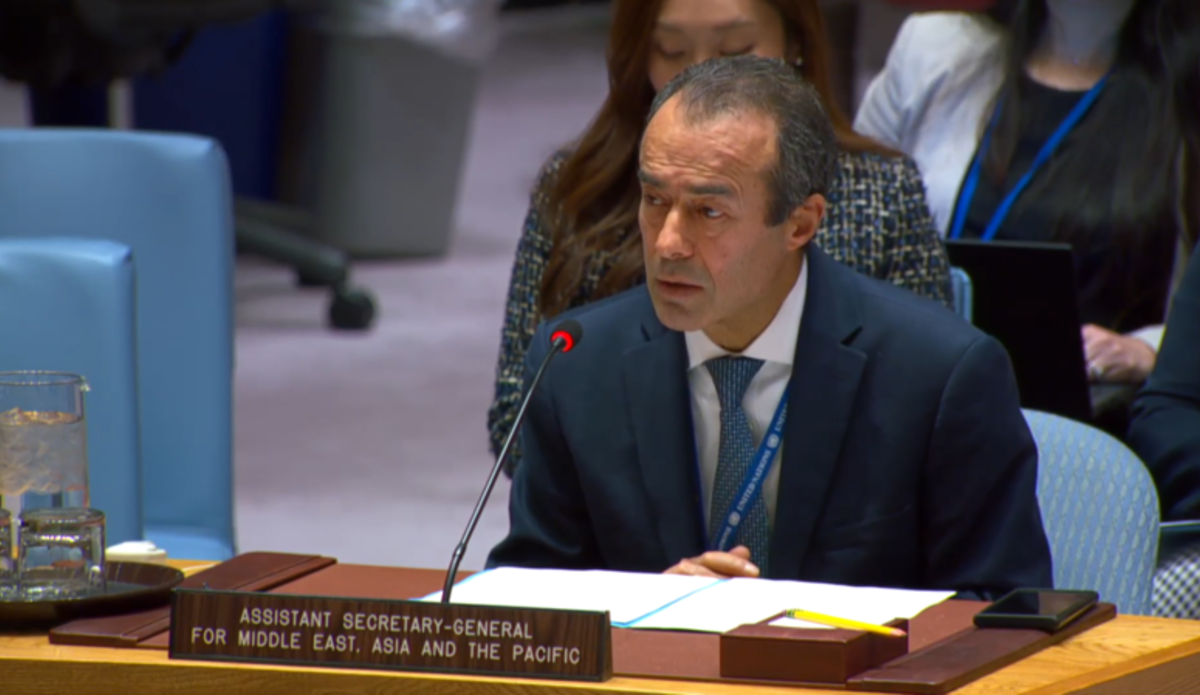Remarks for Mr. Khaled Khiari, Assistant Secretary-General,
Department of Political and Peacebuilding Affairs
REMARKS TO THE SECURITY COUNCIL
ON NON-PROLIFERATION/DPRK
New York, 4 November 2024
Madame President,
Excellencies,
On 31 October, the Democratic People’s Republic of Korea (DPRK) announced through its official news agency that it had launched a Hwasong-19 intercontinental ballistic missile (ICBM) at approximately 7:11 AM local time earlier that day. With a flight duration of one hour and 26 minutes, the missile flew a distance of approximately 1,000 kilometres, reaching an altitude of over 7,000 kilometres before falling into the sea. The DPRK described this latest launch as a “very crucial test” that “updated the recent records of the strategic missile capability of the DPRK”.
Regrettably, the DPRK did not issue any airspace or maritime safety notifications, posing a serious risk to international civil aviation and maritime traffic, with the potential for unintended incidents.
Madame President,
Since the DPRK announced its five-year military development plan in January 2021, aimed at acquiring new military capabilities, it has launched at least 11 ICBMs. The Hwasong-19 sets new records in terms of flight duration and altitude, and is the second solid-fuel ICBM developed by the DPRK which does not need to undergo fueling prior to launch. It is reported to be larger than its predecessor, the Hwasong-18, and may be capable of carrying larger warheads or even multiple warheads.
Madame President,
The DPRK’s launch of yet another ICBM is of serious concern and represents a grave threat to regional stability. Despite numerous meetings of the Security Council in 2023 and 2024, the DPRK has not heeded calls to refrain from further launches.
The Secretary-General strongly condemned the Hwasong-19 launch by the DPRK as a clear violation of relevant Security Council resolutions. He again called for de-escalation, the full implementation of relevant Security Council resolutions, an environment that is conducive to dialogue, and the resumption of talks, emphasizing that diplomatic engagement remains the only pathway to sustainable peace and the complete and verifiable denuclearization of the Korean Peninsula.
Madame President,
We remain deeply concerned about growing tensions on the Korean Peninsula. The DPRK’s persistent pursuit of nuclear weapons and ballistic missile programmes, in violation of relevant Security Council resolutions, continues to undermine the global nuclear disarmament and non-proliferation regime, and the Treaty on the Non-Proliferation of Nuclear Weapons (NPT) that underpins it.
There is a crucial need for practical measures to reduce tensions and reverse this dangerous trajectory. We encourage all Member States to seek unity and to create an environment conducive to dialogue and cooperation. At this challenging juncture for securing global peace and security, it is imperative to prioritize de-escalation and work toward a stable and secure Korean Peninsula.
Madame President,
The United Nations and its partners stand ready to assist the DPRK in addressing the basic needs of its populations. We call on the DPRK authorities to facilitate the full return of the United Nations Resident Coordinator and the UN Country Team. A collective return of the international community would enhance international support for the people of the DPRK and facilitate progress towards the implementation of the 2030 Agenda.
Thank you, Madame President.

